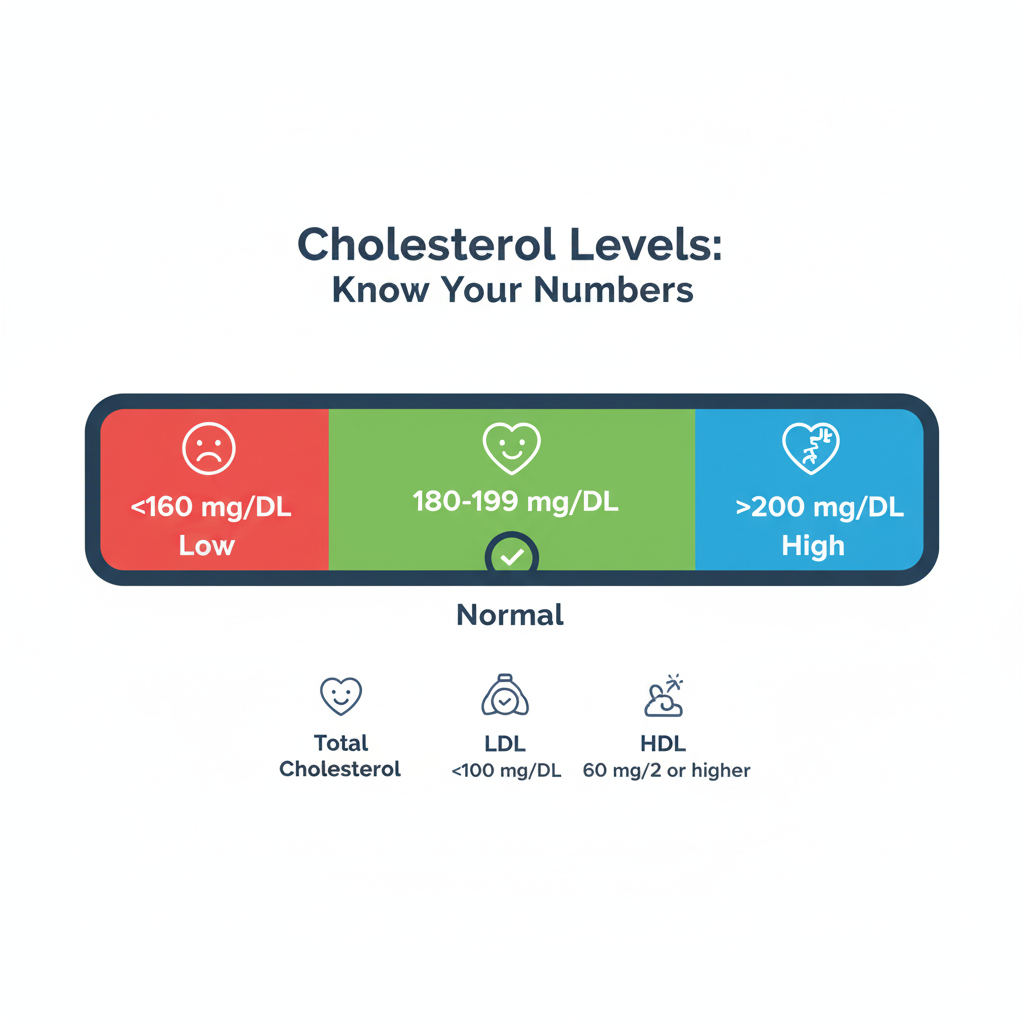Low cholesterol happens when your cholesterol levels drop below normal ranges, which can cause serious health problems including mood changes, digestive issues, and increased disease risk. This condition needs attention just like high cholesterol does.
What Is Cholesterol
Cholesterol is a waxy substance your body needs to work properly. It helps make hormones, vitamin D, and substances that help you digest food. Your body has two main types:
- LDL cholesterol - Called "bad" cholesterol because too much can clog arteries
- HDL cholesterol - Called "good" cholesterol because it removes bad cholesterol from your blood
Your cells need cholesterol to stay healthy. It forms cell walls and helps make important hormones your body uses every day.

Normal vs Low Cholesterol Levels
Doctors measure cholesterol in milligrams per deciliter (mg/dL) of blood. Here are the normal ranges:
- Total cholesterol: Less than 200 mg/dL
- LDL cholesterol: Less than 100 mg/dL
- HDL cholesterol: 60 mg/dL or higher
Low cholesterol means your total cholesterol is less than 160 mg/dL. Normal levels range from 180-199 mg/dL. When levels drop too low, your body cannot make enough hormones and other substances it needs.
Why Monitor Cholesterol Levels
Checking your cholesterol helps catch problems early. Most people worry about high cholesterol, but low levels can be just as dangerous. Regular testing helps you:
- Find health risks before they get worse
- Prevent serious conditions
- Keep your heart healthy
- Make better health choices
%20(1).png)
What Causes Low Cholesterol
Several factors can make your cholesterol drop too low. Understanding these causes helps you know what to watch for.
Genetic Causes
Some people are born with conditions that cause low cholesterol:
- Hypobetalipoproteinemia - Your body does not make enough LDL cholesterol
- Familial Combined Hypolipidemia - A rare condition where all lipid levels stay very low
These genetic conditions often show up early in life. Family history matters when doctors check for cholesterol problems.
Diet and Nutrition
What you eat affects your cholesterol levels. Very low-fat diets can drop cholesterol too much. Your body needs some fat to make cholesterol. To keep levels balanced:
- Eat healthy fats from fish, avocados, and nuts
- Do not cut out all fats from your diet
- Make sure you get enough nutrients
Medical Conditions
Some diseases can lower cholesterol levels:
- Hyperthyroidism - Too much thyroid hormone breaks down cholesterol too fast
- Liver disease - Your liver makes cholesterol, so liver problems affect production
- Malabsorption disorders - Conditions like celiac disease stop your body from absorbing nutrients properly
These conditions need medical treatment to fix the cholesterol problem.
Medications
Some medicines can lower cholesterol too much:
- Statins - Taking too much can drop levels below normal
- Niacin - Used to raise good cholesterol but may lower total cholesterol too much
Always work with your doctor when taking cholesterol medicines. They need to check your levels regularly.
Symptoms of Low Cholesterol
Low cholesterol symptoms can be hard to notice at first. They often develop slowly and may seem unrelated to cholesterol.

Physical Symptoms
- Fatigue - Feeling tired all the time without a clear reason
- Weakness - General muscle weakness or feeling run down
- Digestive problems - Bloating, discomfort, or trouble absorbing nutrients
These symptoms happen because your body cannot make enough hormones and bile acids.
Mental Health Effects
Cholesterol helps make serotonin, a brain chemical that controls mood. Low levels can cause:
- Depression - Feeling sad or hopeless for long periods
- Anxiety - Worry or nervousness that interferes with daily life
Mental health symptoms from low cholesterol are real and need treatment.
Digestive Issues
Your body uses cholesterol to make bile acids that help digest food. Without enough cholesterol:
- Bloating and pain - Food does not digest properly
- Poor nutrient absorption - Your body cannot get vitamins and minerals from food
These problems can lead to malnutrition if not treated.
Hormone Problems
Cholesterol is the building block for many hormones. Low levels can cause:
- Reproductive issues - Irregular periods or fertility problems
- Adrenal problems - Trouble managing stress and energy
Health Risks of Low Cholesterol
Low cholesterol increases your risk for several serious health problems. These risks are real and need medical attention.
Cancer Risk
Research shows low cholesterol may increase cancer risk. Cholesterol helps keep cell walls strong and makes hormones that protect against abnormal cell growth.
- Breast and colon cancer - Studies link low cholesterol to higher risk
- Cell membrane problems - Weak cell walls may allow cancer to develop more easily
More research is needed, but keeping normal cholesterol levels may help prevent cancer.
Stroke and Heart Problems
Very low cholesterol can hurt your heart and brain:
- Hemorrhagic stroke - When blood vessels in the brain rupture
- Heart rhythm problems - Irregular heartbeats that can be dangerous
This is different from high cholesterol risks. Both too high and too low can cause problems.
Brain and Nerve Issues
Your brain needs cholesterol to work properly. Low levels may cause:
- Memory problems - Trouble thinking clearly or remembering things
- Dementia risk - Some studies suggest very low cholesterol may increase dementia risk
Your nervous system uses cholesterol to send signals between nerve cells.
Diagnosis and Testing
Doctors use blood tests to check cholesterol levels. They also look at your symptoms and family history.
.png)
How Doctors Test
- Blood test - Measures total cholesterol, LDL, HDL, and triglycerides
- Family history - Checks if low cholesterol runs in your family
- Physical exam - Looks for signs of underlying conditions
The blood test is usually done after fasting for 9-12 hours.
Understanding Test Results
Your test results show different types of cholesterol:
- Total cholesterol - All types added together
- LDL - Should be less than 100 mg/dL, but less than 60 mg/dL may be too low
- HDL - Higher is better, but very low levels contribute to overall low cholesterol
Talk to your doctor about what your numbers mean for your health.
When to See a Doctor
Get your cholesterol checked if you have:
- Family history of cholesterol problems
- Symptoms like fatigue, mood changes, or memory issues
- Concerns about medications affecting your cholesterol
Regular checkups help catch problems early.
Treatment and Management
Treating low cholesterol involves changing your diet, lifestyle, and sometimes taking supplements or medicines.

Diet Changes
- Add healthy fats - Olive oil, nuts, seeds, and fatty fish like salmon
- Avoid very low-fat diets - Your body needs some fat to make cholesterol
- Eat balanced meals - Include fruits, vegetables, whole grains, and lean protein
Work with a nutritionist if you need help planning meals.
Supplements
Some supplements may help raise cholesterol:
- Omega-3 fatty acids - Fish oil can increase HDL cholesterol
- Coenzyme Q10 - Supports heart health
Always ask your doctor before taking supplements.
Lifestyle Changes
- Exercise regularly - At least 150 minutes of moderate activity per week
- Manage stress - Try yoga, meditation, or other relaxation techniques
- Maintain healthy weight - Being at a good weight helps cholesterol balance
Small changes can make a big difference over time.
Conclusion
Low cholesterol is a real health concern that needs attention. It can cause fatigue, mood problems, digestive issues, and increase your risk for serious diseases. The causes include genetics, diet, medical conditions, and medications.
Recognizing symptoms early helps you get treatment faster. Work with your doctor to test your cholesterol and understand what your results mean. Treatment usually includes eating more healthy fats, exercising, and managing stress.
Regular checkups are important for monitoring your cholesterol levels. Stay informed about your health and do not ignore symptoms that might be related to low cholesterol. With proper care, you can maintain healthy cholesterol levels and feel better.
Frequently Asked Questions
Can cholesterol be too low?
Yes, cholesterol can be too low. Very low levels can disrupt hormone production and cause health problems. Talk to your doctor if you have concerns about your cholesterol levels.
Is low cholesterol always dangerous?
Not always. Some people naturally have low cholesterol and feel fine. However, if you have symptoms like fatigue or depression, you should get tested and talk to a healthcare provider.
What lifestyle changes help increase cholesterol?
Eat more healthy fats from foods like avocados, nuts, and fish. Exercise regularly and avoid trans fats. Always consult your doctor before making major diet changes.
How do doctors diagnose low cholesterol?
Through blood tests that measure different types of cholesterol. Your doctor will also consider your symptoms, family history, and overall health when making a diagnosis.
When should I see a doctor about cholesterol?
See a doctor if you have persistent fatigue, mood changes, or digestive problems. Also get regular checkups to monitor your cholesterol levels, especially if low cholesterol runs in your family.
.png)



.png)
.png)
.png)
.png)
.png)
.png)
.png)

.png)
.png)
.png)

.png)
.png)
.png)
.png)
.png)
.png)

.png)
.png)

.png)
.png)
.png)

.png)

.png)


.png)







